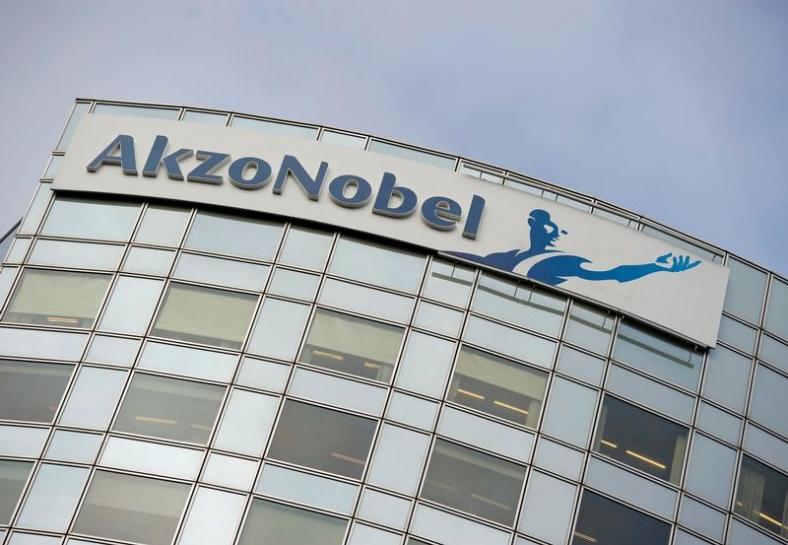
Dutch paints and coatings maker Akzo Nobel NV (AKZO.AS) rejected a 21 billion euro ($22 billion) bid from larger U.S. rival PPG Industries Inc (PPG.N) on Thursday, saying instead it wanted to “unlock value” by spinning off its chemicals business.
AMSTERDAM Dutch paints and coatings maker Akzo Nobel NV (AKZO.AS) rejected a 21 billion euro ($22 billion) bid from larger U.S. rival PPG Industries Inc (PPG.N) on Thursday, saying instead it wanted to “unlock value” by spinning off its chemicals business.
PPG’s unsolicited offer comes just days before an election where the vulnerability of the biggest Dutch companies to foreign takeover has been an issue.
Underlining such concerns, the country’s Economic Affairs Minister Henk Kamp said the proposed deal was “not in the interest of the Netherlands.”
Akzo Chief Executive Ton Buechner said the maker of Dulux paint was best placed to create value itself and was looking at floating or selling its specialty chemicals arm, which accounts for roughly a third of sales and earnings, with a 2016 operating profit of 629 million euros on sales of 4.8 billion euros.
The cash and share offer from PPG was “unsolicited, non-binding and conditional” and worth around 83 euros per share, Akzo said. The bid represented a 29 percent premium to Akzo’s closing price of 64.42 euros on Wednesday and its shares almost 15 percent to 73.95 euros on Thursday, nearing all-time highs.
Pittsburgh-based PPG confirmed its approach on Thursday, saying its proposal was “attractive and comprehensive.”
“We believe a combination is a very compelling strategic opportunity,” said CEO Michael McGarry in a statement, adding he believed it was in the interest of shareholders, employees and customers as well.
“PPG…has devoted has devoted significant time and resources to analyzing a potential combination of PPG and AkzoNobel and is confident in its ability to execute and complete the proposed transaction,” it said.
But Buechner said Akzo’s management and supervisory boards had concluded that the PPG proposal failed “to reflect the long-term value creation potential of the company”.
PPG’s offer was also risky because cost savings were uncertain, it would lead to a highly leveraged company, and it stood a good chance of being blocked by regulators, he added.
However, analysts said there could be merit in a deal.
“In our view, Akzo Nobel could in large parts be a good fit for PPG in a fragmented global coatings market,” said Kepler Cheuvreux analyst Christian Faitz in a note.
Faitz said the pair were the two biggest players, with PPG holding 12 percent of the market and Akzo another 9 percent.
“One significant overlap would be in automotive refinish, while all other segments except for decorative paints in Europe would be a good complementary fit,” he said.
In the United States, paintmaker Sherwin Williams is in the process of buying Valspar in a deal worth $11.3 billion.
DUTCH TAKEOVER DEFENSES
Analyst Jauke de Jong of AFS Group in Amsterdam said he thought regulators would oppose the deal on antitrust grounds and he doubted PPG could overcome Akzo opposition.
“AkzoNobel has sufficient takeover defenses to block a hostile takeover,” he said.
Like many Dutch companies, Akzo Nobel has strong defenses in place against a hostile takeover. Under a 1928 provision, members of its supervisory board hold “priority shares” granting them the right to make binding nominations to the management board or amend the company’s articles of association.
Buechner said Akzo had intended to announce plans to sell or float the specialty chemicals division later this year, but had brought forward the announcement after PPG’s offer.
ING Bank analyst Stijn Demeester said the division could be sold for around 9 times 2016 EBITDA of 953 million euros, or around 8.6 billion euros.
“The reason to do that would be that it would lead to a re-rating of the rest of Akzo’s businesses” which trade at a discount to peers, he said.
People close to the matter said that Akzo would likely market the asset to peers such as BASF (BASFn.DE), Sabic, Celanese (CE.N) and Eastman (EMN.N) as well as private equity groups.
If Akzo does spin off the division, it will be the latest in a series of European companies to attempt to unlock greater shareholder value by doing so.
In a such event, the unit would likely fetch a lower valuation, possibly around 8 times its core earnings, one of the people said.
Akzo’s specialty chemicals business makes ingredients used in industrial processes and products, including polymers, salt and chloralkalines used for making everything from foodstuffs to household products, paper, vehicles and constructing buildings.
Akzo, which has net debt of 1.25 billion euros, fell short of analyst earnings estimates in the last three months of 2016, as its marine and energy sectors weighed. Restructuring costs also pressured results.
In January PPG reported adjusted full year operating income of $1.55 billion. It has net debt of $3.8 billion and a market capitalization of $27 billion.
Akzo is being advised by Lazard and HSBC. PPG is being advised by Goldman Sachs.
(Additional reporting by Thomas Escritt, Arno Schuetze, Thyagaraju Adinarayan and Danilo Masoni)
 0 comments
0 comments





